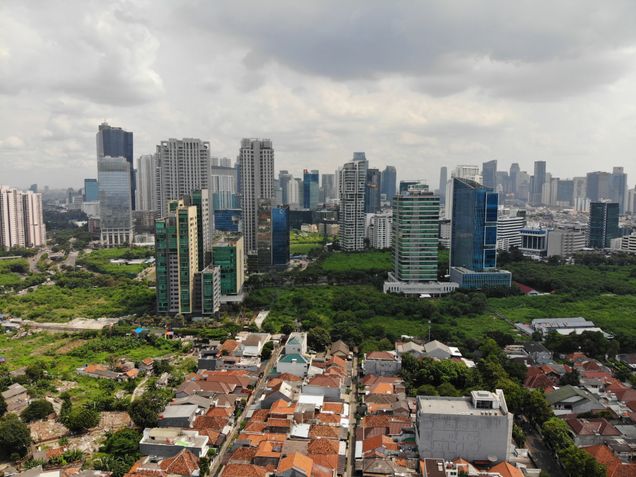Transition Spillover Risk and IMF Surveillance – Task Force on Climate, Development and the IMF Round-Up

Staring down the most crucial decade for climate action, world leaders are putting ambitious climate pledges on the table, and next week’s UN Intergovernmental Panel on Climate Change (IPCC) report promises to serve as an updated blueprint for reducing emissions.
Swift, bold climate action is necessary, but climate policies that aren’t designed properly could have serious negative impacts on other countries, undermining efforts to build stable, green economies around the world and foster an orderly transition to a low-carbon economy. This ‘transition spillover risk’ and its relation to the International Monetary Fund (IMF)’s mandate has been largely unexplored – with potential consequences for developing countries.
The Task Force on Climate, Development and the International Monetary Fund seeks to fill this crucial gap by providing some of the first technical research and policy recommendations for the IMF to incorporate transition spillover risk into its existing surveillance and advice. As the only rules-based, multilateral organization charged with maintaining the financial stability of the international monetary and fiscal system for long-run growth, the IMF is uniquely positioned to mitigate the economic impacts of climate change and play a global coordinating role.
Explore two new technical papers and a policy brief with policy recommendations for the IMF below:
The Global Impact of a Carbon Border Adjustment Mechanism
 In 2021, the European Union (EU) adopted a resolution to implement a Carbon Border Adjustment Mechanism (CBAM) as a part of the European Green Deal. The CBAM will impose a levy on imported non-EU products that adjusts for the differences between the EU Emission Trading System (ETS) price and carbon price paid in the producing countries. The CBAM will come into force in January 2026 after a three-year transition.
In 2021, the European Union (EU) adopted a resolution to implement a Carbon Border Adjustment Mechanism (CBAM) as a part of the European Green Deal. The CBAM will impose a levy on imported non-EU products that adjusts for the differences between the EU Emission Trading System (ETS) price and carbon price paid in the producing countries. The CBAM will come into force in January 2026 after a three-year transition.
Carbon border taxes, however, have been debated in many countries over the past decade, and remain highly controversial. There are concerns that a unilateral EU CBAM will not only distort international trade, but also shift the burden of addressing climate change to developing countries.
A new technical paper by He Xiaobei, Zhai Fan and Ma Jun aims to contribute to the policy discussion by using a quantitative approach to assess the “spillover effects” of the CBAM and identify the vulnerable countries that are most likely to be impacted by such spillover effects. Read the technical paper.
Climate Transition Spillovers and Sovereign Risk: Evidence from Indonesia

In a new technical paper, Régis Gourdel, Irene Monasterolo and Kevin P. Gallagher analyze how China’s drop in coal demand would affect the economic and financial performance of Indonesia’s fossil fuel sector, as well as have indirect effects on its gross domestic product (GDP), employment, balance of payments and debt-to-GDP ratio. Critically, the paper provides an operative framework through which the IMF can trace the channels of spillover risk and quantitatively assess them in their Financial Stability Assessment Programs (FSAPs).
The authors find there is a trade-off between sovereign risk and decarbonization in Indonesia. On one hand, a reduction in coal demand from China leads to lower emissions, though it does not fall enough to meet Indonesia’s climate target. On the other, the downturn in Indonesia’s mining sector will result in higher unemployment, lower GDP, lower public revenue and a higher debt-to-GDP ratio. The decrease in coal demand from China translates into a 6 percent drop in Indonesia’s GDP by 2050. Read the technical paper.
Transition Spillover Risks and IMF Surveillance on Climate Change: Implications for Developing Countries

Climate change policies that occur in one nation can have significant macro-critical implications in other countries. A new policy brief from the Task Force discusses how carbon taxes and CBAMs pose ‘transition spillover risks’ that affect trade patterns, balance of payments and debt sustainability in developing countries. Critically, as the only rules-based, multilateral institution charged with maintaining the financial stability of the global economy, it is paramount that the IMF incorporate such risk analysis into its surveillance activities.
The policy brief synthesizes the two Task Force technical papers on spillover risk and outlines four key policy recommendations for the IMF and beyond. Read the policy brief.
*
Read the latest research from the Task Force on Climate, Development and the IMF. Never miss an update by subscribing to the Task Force Newsletter.
